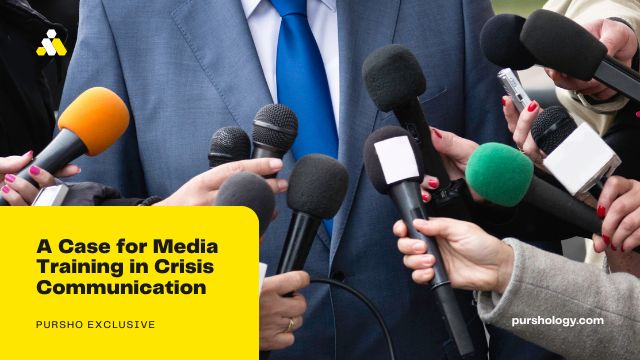Imagine you’re the head of an airline company, and an airplane suddenly goes missing.
The families of the 239 people aboard the aircraft have so many questions. They especially want to know what happened to their loved ones, what you’re doing in response to the disappearance, and whether you’re doing enough to find their family members. Would you face the media, and what would you say?
This question is undoubtedly tricky, but you’ll probably find it easier to answer if you’ve had some form of media training.
What Is Media Training?
Put simply, media training is coaching on how to talk to members of the press.
Do you have a one-on-one interview at a talk show? Has a journalist been dogging your footsteps to make you give in and answer their questions? Did you wake up one day with your company plastered all over the news and press people camping on your doorsteps in the hopes you’ll give them some clarity?
Whatever the reason or circumstance — perhaps your job requires it — if you must talk to members of the press, you can use some media training.
What You’ll Get From Media Training
Media training is not coaching on what to say per se. Instead, it’s training on how to become an effective communicator in media interviews so that the journalist, the reporter, or the press, in general, will hear and understand what you intend to say.
How many times have you heard public personalities say that the press quoted them out of context, subsequently putting them in a negative light or gravely diluting their message? With media training, you can minimize the risk of this happening.
As an effective communicator, you will be able to convey your message as it is. This will probably increase the likelihood of the press quoting the right soundbite, one that clearly expresses your meaning.
Media training will also teach you how to imbue your statements with impact. You’ve heard the expression, “There’s more than one way to skin a cat.” You can take this to mean there’s more than one way you can say something.
Take a famous soundbite, for example, John F. Kennedy’s “Ask not what your country can do for you, ask what you can do for your country,” which he spoke at his inaugural address. He could have just said, “You are privileged to be citizens of the United States of America, but you must also think about the responsibilities that come with such a privilege.”
There’s nothing wrong with the second statement. However, it lacks the impact of the former.
With media training, you will learn how to craft soundbites or quotable quotes that the members of the press would love to include in their write-ups or reports because they read and sound good — i.e., they are impactful.
Communicating in a Crisis
Media training is particularly useful in a crisis.
In a crisis, you cannot avoid the media. Well, you can — albeit with much difficulty — but you will seem either woefully defensive or grievously gutless when you do.
Indeed, in times of crisis, the best rule is not to hide from the media. You’d want to talk to the media to:
- Address wrong information
- Minimize speculation
- Tell the truth or provide the correct information
In other words, in a crisis, you talk to the press to address false reports. You can also speak to the media to prevent incorrect information from spreading proactively. It’s like saying, “Here’s the truth straight from the horse’s mouth, so you don’t need to go to dubious sources.”
Of course, the right strategy will depend on specific circumstances. Should you be forthright or non-committal? Should you immediately respond, or should you take your time?
In the Case of a Lawsuit: It Makes Sense to Take Your Time
In November 2019, Burger King faced a lawsuit by a vegan customer, Phillip Williams.
Williams claimed he was duped into buying the more expensive Impossible Whopper. The company’s advertisements said the burger had zero percent beef when, in fact, the company cooked the plant-based patties on the same grill they used for meat patties. Thus, Impossible Whopper patties were coated in meat by-products. Williams wanted to sue for damages caused by the company’s false advertisement.
When the lawsuit first appeared in the news, Burger King and its parent company did not say anything about the claims. They did not deny the allegations or respond to the plaintiff’s points. They followed their company policy and, on requests for comment from the media, only had this to say, “The company does not comment on active litigation.”
However, whenever the company made a court filing, it would make a statement summarizing the essence of its official response.
For instance, in January 2020, Burger King said the company never billed the Impossible Whopper as a vegan option. It also never promised in its ads that the company cooked the Impossible Whopper in a certain way.
That statement was powerful because it went right to the heart of the issue. There couldn’t have been any false advertising when the company never made the erroneous claim.
Burger King’s media response was more effective because the company waited until it had a statement aligned with its legal response. If it had responded immediately, without first consulting the legal team on what it intended to do, the company could have painted itself into a corner. This could have left it with no room to maneuver or committed it to a specific course of action.
More importantly, it used the right words. From the start, it said it did not comment on active litigation. It’s a carefully neutral, non-inciting statement.
What they did proved to be the right decision.
In July 2020, a federal judge dismissed the lawsuit as having no basis, saying Burger King did not deceive its vegan, vegetarian, and other customers into thinking the company cooked the Impossible Whopper patties on a separate grill.
In Life and Death Matters: It Pays to be Prompt, Accurate, and Sensitive
Do you recall the example used at the opening of this writeup about imagining you were the head of an airline with a plane gone missing? That actually happened.
On 8 March 2014, a Malaysia Airlines Boeing 777-200 aircraft, flight MH370, disappeared from air traffic control radar screens 39 minutes after its Kuala Lumpur take-off. Nobody knew where the airplane, its 227 passengers, and 12 crew members were.
In a scenario like this, it is of utmost importance that a company be forthcoming with information, however little such information might be, and that it delivers such information with sensitivity. Otherwise, it could make an already bad situation worse.
In this case, one of the missteps was a mass text message sent to the grieving relatives of the missing flight’s passengers and crew to say that the company assumes “beyond all reasonable doubt” that none of those aboard that flight survived. This came at the heels of vague statements and the people in charge’s refusal to comment and answer questions.
You can imagine how this caused quite the furor, with relatives collapsing in anguish and people clamoring for the chief executive’s resignation.
Even someone with media training wouldn’t find such a situation easy to handle. However, media training would have at least helped prevent such backlash.
Media training will enable you to find the right words to convey your message.
If you provoke controversy or outrage with a wrong decision, media training will equip you with the right skill set to communicate your sincere apologies and, even in a small way, help reduce the hurt you may have inadvertently caused.
Get Trained to Speak With the Media
Journalists, reporters, and news anchors are professionals who need information to relay to their audience.
Instead of shying away from them, talk to them and use their platform to communicate with the public. Of course, to do so effectively and with impact, you need media training.
AUTHOR BIO
Hisham Wyne is an award-winning copywriter, brand consultant and content creator based in Dubai. He has over a decade’s experience in helping brands get their messages right. From crisp web copy and zippy brochures to in-depth company profiles and analytical annual reports, Hisham makes words work for you – so you can sell better, gain visibility, and give your brand a unique voice.
During his time in the Middle East, Hisham has collaborated extensively with blue-chip companies including Twitter, Microsoft, LinkedIn, Harley-Davidson and Aston Martin, and helped government concerns such as the Dubai Internet City, in5 and the Dubai Design District.




